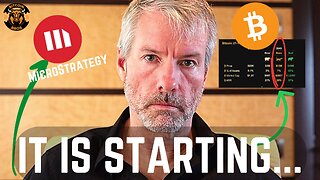Premium Only Content

Victor Davis Hanson Just Told The Nation What No One Expected...
How are immigrant communities shifting their political loyalties in California? What factors are driving this change, and what does it mean for the state's future? Victor Davis Hanson delves into these pressing questions, exploring the evolving dynamics of immigrant communities and their relationship with the Democratic Party.
Hanson begins by highlighting a growing realization among immigrant communities: the Democratic Party increasingly represents the very rich and the very poor, leaving those who aspire to rise out of poverty feeling excluded. He describes how these communities are starting to question their political affiliations, especially as they face challenges such as high taxes, burdensome regulations, and cultural issues imposed by a distant elite.
One of the key factors Hanson points out is the disconnection between the state's elite and the everyday experiences of its residents. He recounts conversations with locals who express frustration over issues like transgender policies in schools, anti-Catholic sentiments, and the deteriorating state of public infrastructure. These residents, often feeling the brunt of policies that seem out of touch with their values and needs, are beginning to question their loyalty to a party that seems increasingly alien to them.
He also touches on the economic disparities exacerbated by current policies. High gas taxes, poor public services, and unaffordable housing are driving many middle and upper-middle-class residents to reconsider their political choices. Hanson illustrates this with vivid examples: congested highways, failing schools, and the stark contrast between high taxes and declining quality of life. He explains that these issues are prompting a reevaluation of political allegiances, particularly among those who had previously benefited from social services but now find themselves burdened by the state's liberal policies.
Furthermore, Hanson highlights a significant demographic shift. Immigrants from diverse backgrounds, including Asia and Latin America, who have experienced different political systems, are increasingly questioning the promises of progressive policies. These new immigrants, having seen the failures of socialism and quasi-socialism in their home countries, are less likely to remain loyal to the Democratic Party, adding to the volatility of California's political landscape.
Hanson concludes by reflecting on the future of California, noting the state's ideological trajectory and the potential for significant political upheaval. As more residents and immigrants alike find themselves at odds with the state's current direction, the stage is set for a major realignment. This detailed analysis provides a comprehensive overview of the factors driving political change in California and what it could mean for the state and its residents.
-
 11:37
11:37
BitcoinBros
1 day agoU.S. Bitcoin Reserve Is STARTING NOW!!! - Bitcoin & $MSTR Update 2025
181 -
 LIVE
LIVE
RG_GerkClan
2 hours ago🔴LIVE - I'm Back! What a Week, Lets Dominate - Escape From Tarkov - Gerk Clan
128 watching -
 5:18:45
5:18:45
TonYGaMinG
6 hours ago🟢LIVE NOW - DAYZ with @BeemoGG and @VladsGamingCartel #RumbleGaming
154 -
 29:05
29:05
The Why Files
5 days agoNuclear Powered Evolution | The Wolves of Chernobyl Reveal Human Potential
35.5K45 -
 4:23:03
4:23:03
Akademiks
15 hours agoASAP Rocky Case has Begun . He's facing 24 years for SH**ting his friend!
110K58 -
 4:03:43
4:03:43
Benny Johnson
16 hours ago🚨Pete Hegseth Senate Confirmation Vote Happening LIVE NOW | MAJOR Shakeup at Pentagon
338K702 -
 2:14:18
2:14:18
FreshandFit
14 hours agoCastle Club Zoom Call Show
129K7 -
 1:01:08
1:01:08
SNEAKO
14 hours agoFRIDAY NIGHT VIBES
71.5K12 -
 1:16:47
1:16:47
Talk Nerdy 2 Us
20 hours agoTrump’s Biggest Sign, Sticker Mule’s Secrets & The Cybersecurity Threats They Don’t Want You to Know
43K6 -
 4:57:20
4:57:20
Robert Gouveia
17 hours agoHegseth Final Vote; Trump SLAPS Biased D.C. Judge; Rebuilding North Carolina
76.5K104